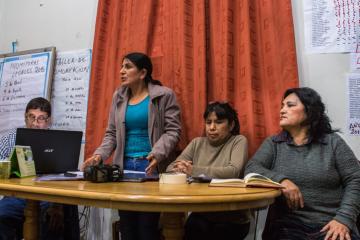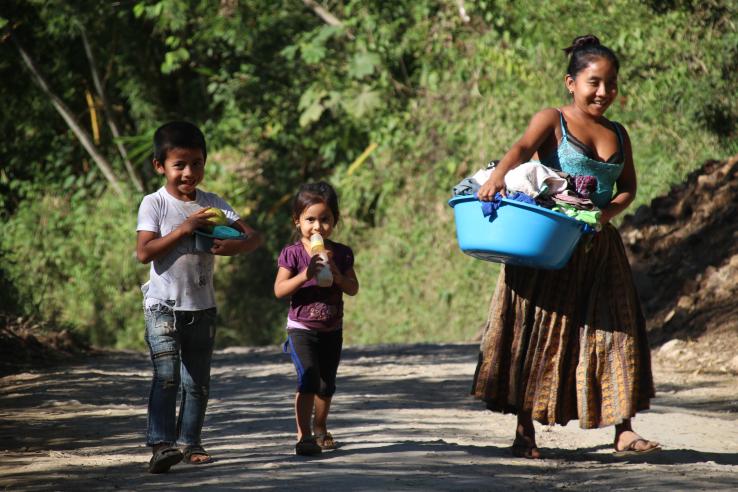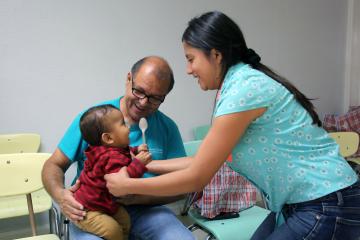
Strengthening livelihoods in Central America through evidence

With the generous support of the Cotopaxi Foundation, J-PAL Latin America and the Caribbean (J-PAL LAC) just launched a project that aims to improve livelihoods in Central America. The project, “Strengthening Livelihoods in Central America Through Evidence Use,” will share evidence, strengthen local capacities, foster research, and promote effective interventions to help individuals overcome barriers throughout different stages of life.
Central America faces significant socioeconomic challenges, including high poverty rates and income inequality. However, with over fifty million inhabitants and a relatively young population, the region has the demographic potential for economic and social advancement in the coming years. Our new project will leverage that opportunity and foster programs that help people overcome the barriers that prevent them from fully developing their capabilities and achieving improved living conditions.
Broadening the focus, keeping the gender lens
Last year, we worked together with the Cotopaxi Foundation to strengthen capabilities for evidence generation and use when promoting women's agency in Central America. Within this project, we offered three seminars with over two hundred participants, delivered an online training on evaluation and evidence use to 44 people from organizations working in the region, and scoped research opportunities. This experience allowed us to help local organizations improve women’s lives in the region and gave us a better understanding of the region’s evidence needs.
This year we will build on our previous work and broaden the focus. We will expand beyond women’s agency to also include early childhood development (ECD), education, and economic agency, while keeping a cross-cutting gender lens. The project, “Strengthening Livelihoods in Central America Through Evidence Use,” focuses on investments that help individuals unlock their full potential throughout different stages of life.
Early childhood development
ECD plays a crucial role in enhancing child health and cognitive outcomes while establishing the foundations for long-term well-being. Challenges to ECD include inadequate health and hygiene, malnutrition, insufficient early stimulation and education, and a lack of proper care and security from caregivers and communities. Encouraging cross-sector investments in ECD is essential as they are fundamental in enabling children to realize their full potential, offering a pathway out of poverty, and fostering sustainable development in the region.
Education
Education, a fundamental human right, serves as a powerful catalyst for development and stands as one of the most effective tools in reducing poverty, enhancing health, promoting gender equality, fostering peace, and ensuring stability. It generates substantial and consistent returns in terms of income and represents the primary factor in achieving fairness and social inclusivity. While low- and middle-income countries have made significant progress in expanding access to education, it is important to recognize that students do not always acquire meaningful learning experiences in schools. Therefore, it is crucial to make strategic and impactful investments in education, especially considering the detrimental impact that the Covid-19 pandemic has had on educational systems.
Economic Agency
Economic agency enables individuals to take control of their economic lives and make decisions that shape their well-being beyond the economic dimension. At the individual level, it empowers people to have a voice within their communities and households, granting them access to resources that directly impact their welfare, such as health, nutrition, leisure, education, and additional opportunities. At the aggregate level, economic agency contributes to economic growth and poverty alleviation.
How can organizations participate?
By sharing evidence, strengthening local capacities to act upon that knowledge, and fostering research that addresses remaining questions, the project’s main objective is to encourage organizations to implement effective interventions that pave a way out of poverty in Central America.
We invite organizations in the region working in ECD, education, or labor to engage in the project by:
- Participating in free online trainings. We will have an introductory training on impact evaluation and evidence use and a more advanced one on practical tools for evaluating and applying evidence.
- Attending our evidence-sharing seminars. We will host several free seminars to share evidence on ECD, education, and economic agency.
- Letting us know about your program. If you want to evaluate a program implemented by your organization, let us know and we can discuss the possibilities.
What’s next
This project will be running throughout 2024, and we will share the different activities through J-PAL LAC’s social media (X, LinkedIn) and newsletters (you may register here stating your interest in Latin America and the Caribbean). If you have any questions, please write to Silvana Leiva at [email protected] or fill in this form and we will contact you.



